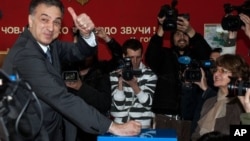PODGORICA, MONTENEGRO —
Montenegrin President Filip Vujanovic claimed a third term on Monday in the largely ceremonial post, but opposition allegations of election fraud could trigger instability in the tiny Adriatic republic seeking European Union membership.
Election authorities declared Vujanovic winner of a Sunday election, but the narrow margin of victory marked a blow for the ruling Democratic Party of Socialists (DPS) after more than two decades in power.
The DPS's Vujanovic, president since 2003, took 51.2 percent of the vote, ahead of opposition challenger and former diplomat Miodrag Lekic on 48.8 percent, the state electoral commission said.
The results were preliminary pending possible challenges.
Sunday's vote ended in confusion, with both Vujanovic and Lekic claiming victory based on their own vote counts.
Lekic said he had won 50.5 percent to Vujanovic's 49.5 percent, and compared the incumbent's victory claim to a "coup d'etat."
Lekic's Democratic Front, the main opposition bloc, warned it would not accept a third term for Vujanovic.
The dispute looked set to usher in an unstable period for the former Yugoslav republic of 680,000 people, which became independent in 2006 and last year embarked on the long process of membership talks with the EU.
"It's clear that this is election fraud," Goran Danilovic, a senior Democratic Front official, told Reuters after the results were announced. "I guarantee we will not allow our victory to be taken from us, whatever it takes."
The bloc said it would freeze participation in all parliamentary working groups, a possible prelude to a full boycott of the assembly.
The president is largely a figurehead, with real power vested in the prime minister, DPS leader Milo Djukanovic.
But the tight race serves as a warning to the DPS, which has dominated Montenegro since federal Yugoslavia's early 1990s breakup and steered the country to independence in 2006 when it narrowly voted in a referendum to end an 88-year union with Serbia.
Analysts say an economic slump triggered by falling foreign investment, and persistent allegations of cronyism and corruption, have eaten into the party's support.
It won re-election in a parliamentary election in October last year, but without an outright majority.
The party said the announcement of the official results should end the controversy.
"It removes all doubt over who the citizens chose as president of Montenegro, and they chose Filip Vujanovic," party official Caslav Vesovic said.
Election authorities declared Vujanovic winner of a Sunday election, but the narrow margin of victory marked a blow for the ruling Democratic Party of Socialists (DPS) after more than two decades in power.
The DPS's Vujanovic, president since 2003, took 51.2 percent of the vote, ahead of opposition challenger and former diplomat Miodrag Lekic on 48.8 percent, the state electoral commission said.
The results were preliminary pending possible challenges.
Sunday's vote ended in confusion, with both Vujanovic and Lekic claiming victory based on their own vote counts.
Lekic said he had won 50.5 percent to Vujanovic's 49.5 percent, and compared the incumbent's victory claim to a "coup d'etat."
Lekic's Democratic Front, the main opposition bloc, warned it would not accept a third term for Vujanovic.
The dispute looked set to usher in an unstable period for the former Yugoslav republic of 680,000 people, which became independent in 2006 and last year embarked on the long process of membership talks with the EU.
"It's clear that this is election fraud," Goran Danilovic, a senior Democratic Front official, told Reuters after the results were announced. "I guarantee we will not allow our victory to be taken from us, whatever it takes."
The bloc said it would freeze participation in all parliamentary working groups, a possible prelude to a full boycott of the assembly.
The president is largely a figurehead, with real power vested in the prime minister, DPS leader Milo Djukanovic.
But the tight race serves as a warning to the DPS, which has dominated Montenegro since federal Yugoslavia's early 1990s breakup and steered the country to independence in 2006 when it narrowly voted in a referendum to end an 88-year union with Serbia.
Analysts say an economic slump triggered by falling foreign investment, and persistent allegations of cronyism and corruption, have eaten into the party's support.
It won re-election in a parliamentary election in October last year, but without an outright majority.
The party said the announcement of the official results should end the controversy.
"It removes all doubt over who the citizens chose as president of Montenegro, and they chose Filip Vujanovic," party official Caslav Vesovic said.





